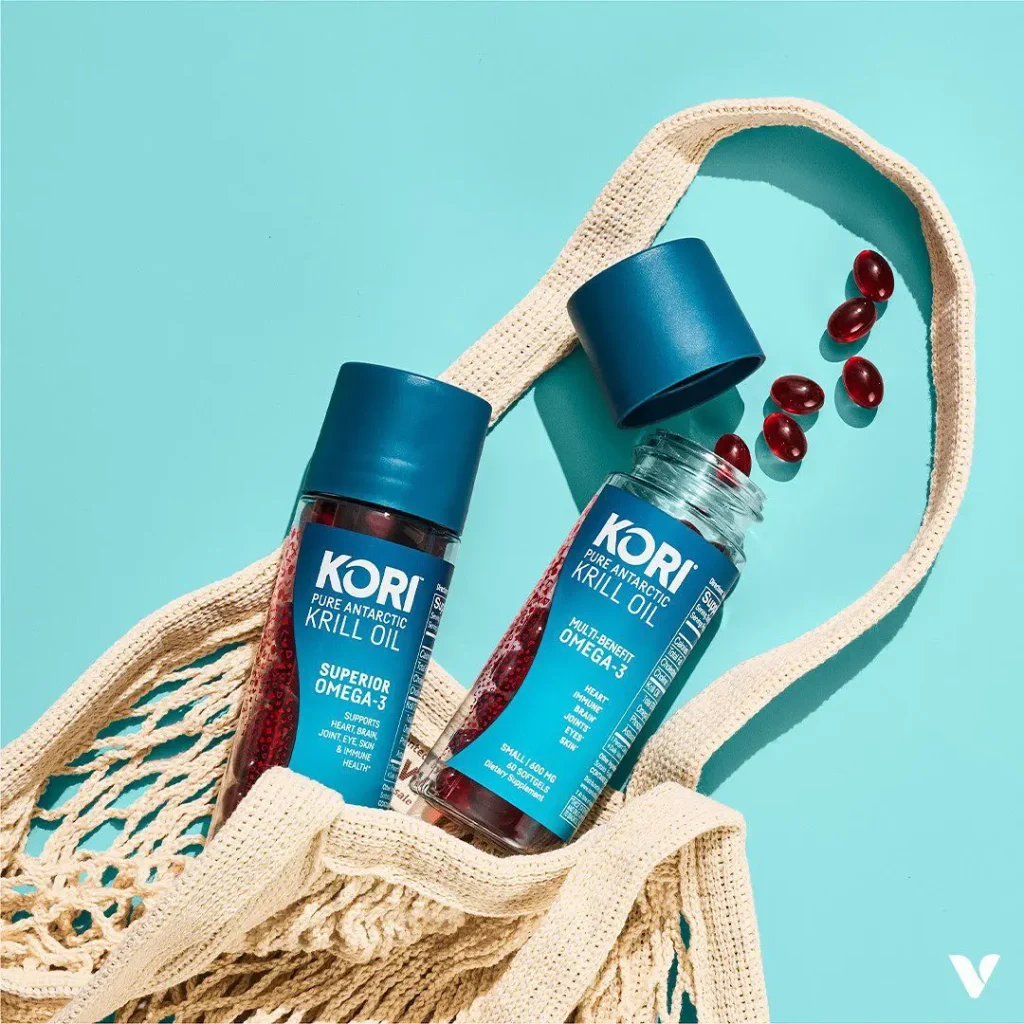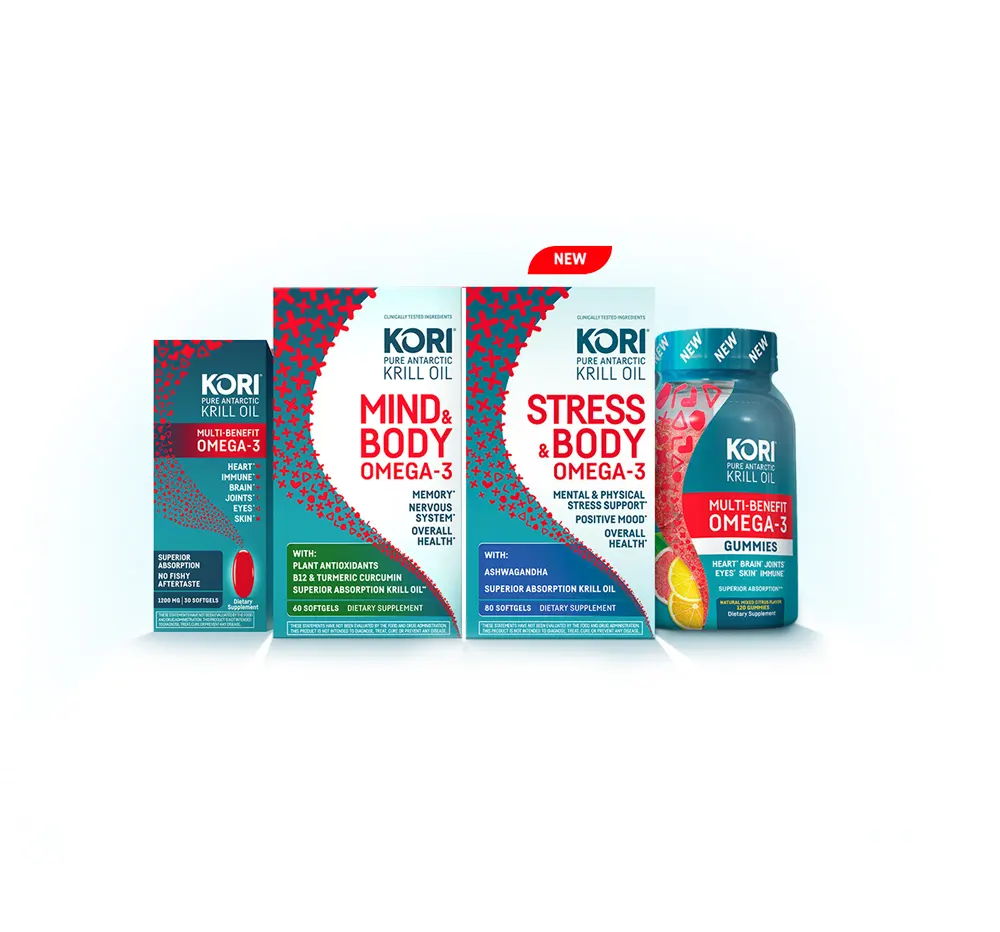Individuals experiencing symptoms of depression and seeking a natural, non-drug solution are turning to the omega-3 DHA and EPA fatty acids in Kori Krill Oil for the antidepressant benefits they provide. Kori Krill Oil sustainably harvests and processes pure Antarctic krill oil, ensuring the highest concentration of beneficial omega-3 phospholipids for optimal antidepressant effects.
Depression can be a serious and potentially life-threatening condition, wherein “an individual feels lethargic, irritable, guilty, has difficulty functioning, takes no enjoyment in life or pleasure in activities, and experiences frequent mood swings,” describes the National Library of Medicine. Depression can lead to suicidal thoughts or intentions. Major depressive disorders are believed to affect hundreds of millions of individuals worldwide.
Kori Krill Oil: The Consumer Preference for Omega-3 All-Natural Antidepressant is an original (BetterNutritionNews) article.
Omega-3 fatty acids studied for depression reduction
Omega-3 fatty acids are being studied for their potential role in reducing the symptoms of depression. Recent research has indicated that omega-3 DHA and EPA phospholipids may lower symptoms of depression and help people regain emotional stability. This is important for those wanting to avoid antidepressant drugs and their associated side effects or for individuals for whom traditional medications have not been effective in alleviating their feelings of depression.
The testing of omega-3 fatty acids as an antidepressant began when researchers observed that depression appears less often in regions where people eat large amounts of fish, which are high in omega-3 fatty acids. Further studies led investigators to conclude that omega-3s “may prevent and/or treat depression and other mood disorders” (Harvard Health):
“Two omega-3 fatty acids—eicosapentaenoic acid (EPA) and docosahexaenoic acid (DHA)—are thought to have the most potential to benefit people with mood disorders.”

How omega-3s may relieve depression
Omega-3s can pass through the brain-blood barrier and travel through brain cell membranes to interact with mood-related molecules within the brain. “Omega-3’s have anti-inflammatory actions that may help relieve depression,” according to Dr. David Mischoulon, MD, PhD, and Professor of Psychiatry at Harvard Medical School:
“More than 30 clinical trials have tested different omega-3 preparations in people with depression. Most studies have used omega-3s as add-on therapy for people who are taking prescription antidepressants that provide limited or no benefit.”
When differentiating between the types of omega-3 fatty acids, Dr. Mischoulon says, “Clinical trials typically use EPA alone or a combination of EPA plus DHA.”
Meta-analyses of findings from multiple studies suggest that omega-3s are effective in reducing depression, with the most effective preparations appearing to have at least 60% EPA fatty acids relative to DHA. However, “While DHA is thought to be less effective as an antidepressant, it may have protective effects against suicide.”
Harvard Medical School’s Dr. Mischoulon cites, “Recent work at Massachusetts General Hospital and Emory University suggests that depressed individuals who are overweight and have elevated inflammatory activity may be particularly good candidates for omega-3 EPA treatment.”
He also mentions, “At Harvard, there is a large study underway examining whether omega-3 supplementation (alone or in combination with vitamin D) can prevent depression in healthy older adults.”

Kori Krill Oil:
The superior source of omega-3
Given the potential anti-depression benefits of omega-3 fatty acids, it is important to ensure a sufficient amount of both omega-3 DHA and omega-3 EPA fatty acids in our diets. Nutritionists and doctors recommend at least two servings of seafood per week, especially cold-water fatty fish, such as salmon, tuna, mackerel, and sardines. However, the majority of Americans favor meat over fish.
By not including enough fish in their diets, 70% of Americans are deficient in omega-3 fatty acids. Fish oil is often recommended as an omega-3 supplement; however, fish oil loses DHA and EPA phospholipids (which form cell structures and membranes) during processing. Consequently, omega-3s sourced from fish oil are neither digested nor absorbed well.
In contrast, the omega-3 DHA and omega-3 EPA fatty acids found in sustainably harvested pure Antarctic Kori Krill Oil are retained at optimal potency during processing. Unlike fish oil, Kori Krill Oil delivers these omega-3s in the most natural phospholipid form that the body needs for superior absorption and digestion.
One daily serving of Kori Krill Oil softgels or gummies provides 250 milligrams of both omega-3 DHA and omega-3 EPA fatty acids, which the FDA equates to two weekly servings of salmon.
Moreover, Kori Krill Oil contains nutrients not found in fish oil, especially choline—an essential nutrient that supports brain and nervous system health. Choline is “a vital nutrient that helps your liver and brain function correctly” (Cleveland Clinic).

Clinically proven to raise omega-3 levels
Kori Krill Oil’s omega-3 DHA and EPA fatty acids are important nutrients for overall brain health. Omega-3 EPAs influence both mood and behavior, while DHA fatty acids are important to brain development. A randomized controlled trial with healthy participants taking recommended daily doses of Kori Krill Oil recorded improved cognitive function after 12 weeks.
In addition to helping to manage depression and improve cognition, Kori Krill Oil’s omega-3 fatty acids are among the most beneficial nutrients available for protecting health, well-being, and longevity; they contribute to the prevention of heart disease and the reinforcement of the immune system:
Consumption of the EPA and DHA omega-3 fatty acids in Kori Krill Oil may lower LDL (‘bad’) cholesterol and triglycerides while raising HDL (‘good’) cholesterol. Other benefits include normalizing circulation, heart rhythm, and blood pressure.
Inflammation is an important immune system response that can be either beneficial or harmful: Kori Krill Oil’s omega-3 DHA and EPA phospholipids play a critical role in helping regulate inflammation, thereby supporting cellular repair and internal defense systems.
A commitment to sustainability
Antarctic krill are small but abundant invertebrate crustaceans that thrive in the icy waters of the Antarctic Ocean. Kori Krill Oil acknowledges its responsibility to the environment and the protection of the krill population in Antarctica, placing the highest priority on sustainability and setting an industry standard as an eco-friendly resource. This commitment is of great importance to ensure a vibrant seafood resource for future generations.
Notably, Kori Krill Oil’s Antarctic krill fishery is one of the most sustainably managed fisheries in the world, as confirmed by numerous studies and research reports from environmentally concerned organizations, awarding Kori Krill Oil’s fishery an “A” rating for seven consecutive years.
Kori Krill Oil’s commitment to sustainability is confirmed by CEO Nancy Chan: “We believe that Antarctic krill is one of the most brilliant resources we have for promoting human health, and advances in science along with increased attention to our health may be leading us to live longer lives.”

A strong and growing market for krill oil
The global krill oil market was valued at USD 235.8 million in 2020; a consolidated annual growth rate (CAGR) of 11.4% projects the market to reach USD 474.0 million by 2028 (Polaris Market Research).
Kori Krill Oil’s Multi-Benefit Softgels and Gummies
Each of the Kori Krill Oil supplement options can provide the FDA-recommended daily serving of 250 milligrams of DHA and EPA omega-3 fatty acids:
Kori Krill Oil Omega-3 Softgels: The most natural phospholipid omega-3 for superior absorption vs. fish oil, with no fishy aftertaste. Provides antidepressant, heart, brain, joint, eye, skin, and immune health benefits.
Kori Krill Oil Omega-3 Gummies: Superior absorption of krill oil is now possible in a new delicious natural mixed citrus flavor gummy form that makes it easy to get your omega-3s.
Kori Krill Oil Mind & Body Omega-3: A powerhouse combination of krill oil omega-3s with brain-nourishing plant antioxidants, B12, and turmeric curcumin for antidepressant effects, improved memory, and enhanced attention.
Kori Krill Oil Stress & Body Omega-3: This unique formula combines ashwagandha and krill oil omega-3s to help manage depression and stress, enhancing mood and sleep.
Kori Krill Oil can be ordered directly on their website and through various retailers, including Amazon, CVS, H-E-B, Kroger, Rite Aid, Sam’s Club, Swanson, Target, Vitacost, Walgreens, and Walmart.

About
Better Nutrition News (BNN) is a digital publication.
Important Note: The information contained in this article is for general informational purposes only, and should not be construed as health or medical advice, nor is it intended to diagnose, prevent, treat, or cure any disease or health condition. Before embarking on any diet, fitness regimen, or program of nutritional supplementation, it is advisable to consult your healthcare professional in order to determine its safety and probable efficacy in terms of your individual state of health.
Regarding Nutritional Supplements Or Other Non-Prescription Health Products: If any nutritional supplements or other non-prescription health products are mentioned in the foregoing article, any claims or statements made about them have not been evaluated by the U.S. Food and Drug Administration, and such nutritional supplements or other health products are not intended to diagnose, treat, cure, or prevent any disease.



